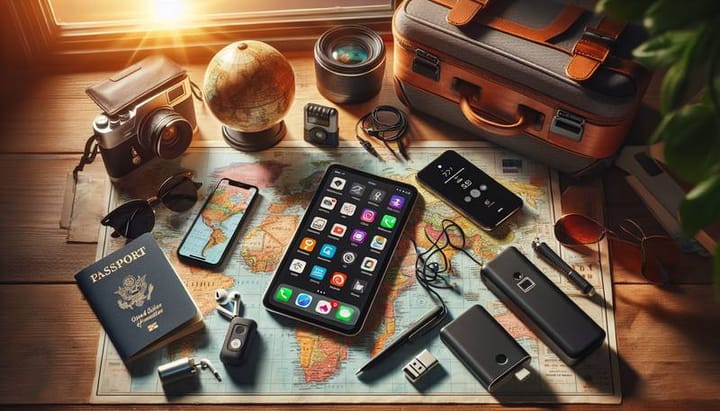Simple Steps to Increase Your Online Privacy

Welcome to a comprehensive guide that will walk you through the ins and outs of increasing your online privacy. In an era where our digital footprints can span across various platforms, understanding how to protect your personal information is critical. The web is a double-edged sword; while it offers convenience and connectivity, it also poses risks to our privacy and security. This guide is crafted with the perfect blend of practical tips and lighthearted insights to equip you with the tools you need to secure your digital life. Whether you're a seasoned internet user or someone who's just starting to explore the online space, follow these straightforward steps to fortify your online privacy confidently.
Understanding Online Privacy
Think of online privacy as your digital sanctuary. It’s the concept of safeguarding your personal data, your conversations, and your identity as you navigate the vastness of the internet. Why does it matter, you might wonder? A breach in your online privacy can lead to identity theft, financial loss, and a slew of unwanted consequences. Plus, there's the simple matter of principle - your private life is yours alone, and having control over who knows what about you is a fundamental right. Understanding the stakes is step one. From cyber criminals looking to steal your identity to corporations tracking your every click for profit, the threats are real. But fear not! Awareness is power, and we'll guide you through anticipating these threats and proactively defending against them.
The Power of Strong Passwords
Passwords are the first line of defense against unauthorized access to your accounts. Yet often, we underestimate the importance of crafting a solid password. A strong password is akin to a complex lock on the door of your online house; the more intricate it is, the harder it is to break. Avoid the cardinal sins of password creation: no pet names, birthdays, or ‘123456’. Instead, shoot for a mix of uppercase and lowercase letters, numbers, and special characters. For length, think more 'novel' than 'short story' - at least 12 characters is a good rule of thumb. Want to take it up a notch? Consider a passphrase. This string of words—random and unrelated—creates a complexity that can stump even the most determined hacker. And don’t recycle passwords; that’s like using the same key for your house, car, and office. If one gets compromised, they all do. Managing a multitude of passwords might sound like a chore, but with tools like password managers, you can store them securely and access them with ease.
Smart Social Media Habits
Love it or hate it, social media is a fixture in most of our lives. It’s where we connect, share, and express ourselves. But remember, the persona we project online should be managed with keen discretion. Start by scrubbing your profiles: that photo from the beach party five years ago, the rant about an ex-employer, or your home address are snippets of your life you might not want the world to see. Privacy settings are there for a reason—use them. They enable you to control who sees your posts, tags, or personal information. Be vigilant and regularly update these settings as platforms often change their privacy policies. Also, the mantra of 'think before you post' has never been more relevant. Once something is online, it’s virtually impossible to retract. Could that comment or photo come back to haunt you? If there's doubt, there’s no place for it on your timeline.
Browsing the Web Anonymously
Your online searches, the websites you visit, and even the comments you leave behind form a digital trail that paints a vivid picture of who you are. To keep your browsing habits under wraps, consider tools designed for anonymity. Incognito or private browsing modes can temporarily prevent your browser from retaining your history, but this doesn't make you invisible to websites or internet service providers. For a cloak of invisibility, a Virtual Private Network (VPN) is your ally. A VPN masks your IP address and encrypts your data, making your online actions untraceable and securing the data from prying eyes. Pair this with a privacy-centric search engine that doesn’t track your queries, and you're on your way to a private browsing experience. Remember, the goal is not to embark on dubious ventures online, but to retain agency over your privacy and be free from unwelcome surveillance.
Email Encryption and Secure Communication
In the realm of digital communication, emails are as commonplace as a handshake once was in business and personal interactions. But just as you wouldn't shout private information across a crowded room, you shouldn't send sensitive data through unsecured email. This is where encryption comes in - the digital equivalent of a sealed envelope. When you encrypt an email, you're converting your message into a code to prevent unauthorized access. Providers like ProtonMail and Tutanota offer end-to-end encryption, meaning only you and your intended recipient can decipher the message. Moreover, always be aware of phishing scams – fraudulent emails masquerading as reputable sources to steal data. They might look convincing, but by checking the sender's email address carefully, hovering over (but not clicking) links to see where they really lead, and being cautious with personal information, you can sidestep these digital traps. Secure communication is not an option; it's a must in safeguarding your online privacy.
The Importance of Regular Privacy Audits
If there's one thing you take away from this guide, let it be the habit of conducting regular privacy audits. You wouldn't leave your windows open when you leave your house, so why leave digital doors ajar? Take stock of all your online accounts and make sure your privacy settings are up to par. Delete accounts you no longer use; the less data you have scattered across the internet, the better. Check the apps on your phone, too. Many apps request access to information they don't actually need – location, contacts, camera, etc. Revoke permissions that aren't necessary for the app's function. This is also a good time to update any software or apps; outdated programs are like aged locks, easier to pick for a cybercriminal. It might seem tedious, but these digital check-ups are fundamental in maintaining a secure online presence.
Conclusion: Taking Control of Your Online Privacy
In an age where our lives are increasingly online, taking control of your online privacy isn't just advisable; it's essential. While it might seem daunting at first, strengthening your digital defenses should now feel more like a series of small, manageable tasks rather than an insurmountable challenge. Embrace strong password practices, fine-tune your social media habits, anonymize your browsing, encrypt your emails, and schedule those privacy audits. Remember, the pursuit of privacy is not about going off the grid – it's about choosing what to share and with whom on your terms. Treat your personal information with the respect it deserves, and it will serve you well. So, venture forth into the digital wild with confidence – secure, savvy, and armed with a shield of privacy that empowers you to connect and explore online without leaving your rights at the login screen.
Now that you're equipped with the knowledge to fortify your online privacy, take these steps and make them habits. Protecting your digital self is a continuous journey but one well worth the peace of mind it brings. Let this guide be the first step towards a more private and secure online world for you. Happy browsing, and remember – your data, your rules.


